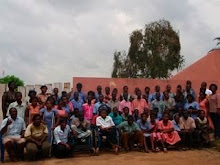When Dr. Kwame Nkrumah became president, after Ghana gained independence in 1957, he set up a committee whose purpose was to create policy guidelines for dealing with people with disabilities. The president of the Commonwealth Association of the Blind, Dr. Wilson, conducted the necessary research and consultations.
The Committee made the following recommendations:
Government should take full responsibility for the care of peple with disabilities as they were currently being killed, abandoned or neglected by society.
Schools for the blind and deaf should be set up.
Due to the fact that the school system did not provide for the integration of people with disabilities, special schools should be established to cater for their special needs.
Special technical and vocational centres should be founded in each of Ghana's 9 regions for those in the post-primary category.
Kumasi's first Centre was established in the district of Kwadaso in 1958. In 1974 the city council changed the location to Edwenase, even though the building was not created for people with disabilities. The area was on the outskirts of the city and the initial priority was to take disabled people off the streets and place them there, isolated from the rest of society. However, after consultations with the Dept. of Social Welfare, it was agreed to include families in the process, sensitising and working with them to deal with their childrens' needs.
The Centre's mandate involved wid-ranging support for all regional, district officers and community workers to identify those with disabilities - including hearing, seeing, moving and learning difficulties - register and bring them to Edwenase for vocational training:
carpentry, electronics, woodcarving, soapmaking, agriculture.
Due to the positive level of government concern, the Rehabilitation Centre's initial stages were successful. All trainees who completed courses were to be given employment in order to boost their status in society. The Dept. of Social Welfare and National Vocational Institute organised a general certification programme for those who had finished their training.
Most were employed by the Ghana Education Service as teachers in their craft, so disabled teachers can be found in most vocational schools.
Grants provided trainees with the necessary capital for equipment and opportunities to start their own business if they didn't want to work for the governement.
After Nkrumah was overthrown many issues concerning those with disabilities were forgotten. Nevertheless, Edwenase Rehabilitation Centre has legal status and though the lack of funding has seriously affected the course content, structure and effectiveness of the project, we are still doing our best to support our students as best we can.
We currently provide Needlework, Dressmaking, Tailoring, Shoemaking, Hairdressing and Beautification, Rural Craft courses for over 70 male and female students who live at the Centre.
In addition to this we have a farm where we grow maize, oranges, plaintains, yam and bananas.
Our students have excellent potential once we are granted better opportunities and funding to train them in life and vocational skills.

